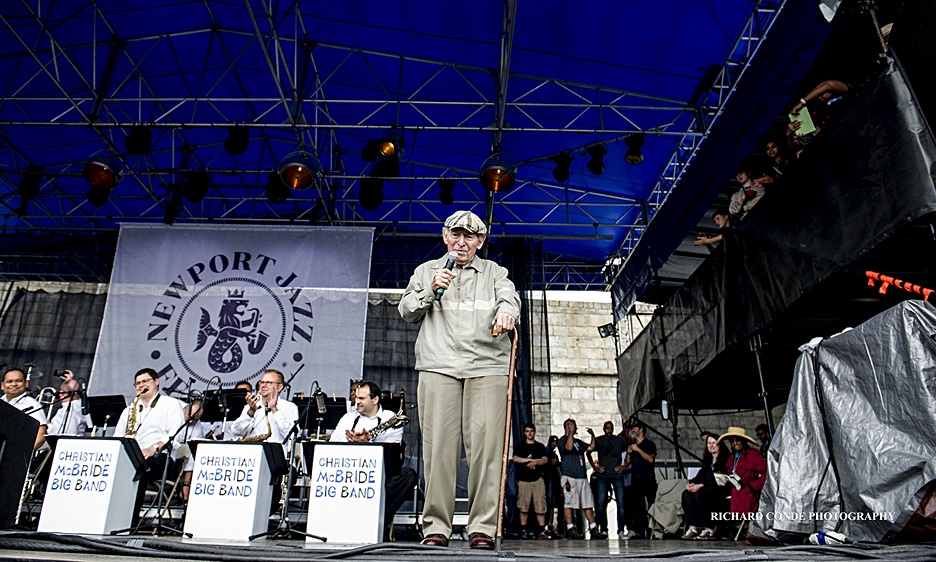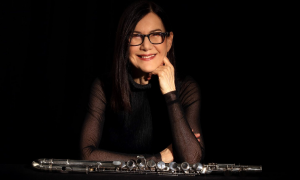Home » Jazz Articles » Interview » George Wein: A Life and Legend in Jazz
George Wein: A Life and Legend in Jazz

George Wein
piano1925 - 2021

Christian McBride
bassb.1972
This is a highlighted selection of questions and answers during that interview.
All About Jazz: Looking at your wide career in jazz, and particularly the Newport Jazz Festival—What keeps your drive and passion going at 91?
George Wein: That's a strange question now. A couple of years ago I might have answered it a little differently, but as my hearing gets worse and my mobility gets worse, the same thing I had, which was the driving passion for the music itself, is not the same—because when I went non profit 6-7 yrs ago I really got involved with the current music scene and I was out 2 to 3 nights a week. I was out meeting with musicians and having them over for lunch and I'm still in a sense still doing that. I had

Jon Batiste
pianob.1986

Rhiannon Giddens
vocals
Duke Ellington
piano1899 - 1974
AAJ: After a lifetime of listening and evaluating musicians—what do you look for beyond talent?
GW: Talent in itself is not enough. Anybody who can play music is talented but they're not all artists. Artistry is what adds a uniqueness to what they are doing. And I have an expression, and you can use this for this interview. When I hear a singer, I ask myself, "do they have their shit together"—which means- -are they just up there singing a song or do they know what they're doing and how they are projecting to an audience. That is what you look for. For instance, I'm going out to hear a girl—Wednesday night—she won the Monk Award last year—and I heard her two years ago—and her first number was great and after that—she lost me—but people tell me that she's much better now so I want to hear her again. So I want to hear her to see if we can put her on the stage at the Newport Jazz Festival, where she can make it.
AAJ: How did your booking choices for the Newport Jazz Festival evolve with changing tastes in music?
GW: In the beginning it was easy—we had

Duke Ellington
piano1899 - 1974

Louis Armstrong
trumpet and vocals1901 - 1971

Sarah Vaughan
vocals1924 - 1990

Miles Davis
trumpet1926 - 1991

Ella Fitzgerald
vocals1917 - 1996
AAJ: Looking at the horizon of your career with the Newport Jazz Festival, how difficult was the decision to pass the reigns on to a successor?
GW: I'd like to go on and on, but you can't and you have to realize you can't, and when you come to that realization, it makes it a little easier. Doesn't make it more pleasant, but it makes it easier. I was doing two things—being both the executive director and the artistic director. Now it's split—

Christian McBride
bassb.1972
AAJ: It's been about 10 to 12 years since the publication of your biography Myself Among Others: A Life in Music, how do you reflect upon it now?
GW: I published that in what 2004—now I've lived a whole other life—a whole lot of chapters, an addendum. The book had its purpose— people like you , writers, et cetera read my book and I'm glad for that. But, every book that comes out about jazz has some reference to my book. Anybody who's writing biographies about the great musicians, make reference to mine, so I'm proud of that. I didn't expect to write a bestseller, but I've sold enough copies, so I'm happy.
AAJ: How has the music industry and performance venues changed to what they are today?
GW: When I started back in the 1950's, the clubs were the thing, in other words, there were good clubs in Los Angeles, Chicago, Philadelphia, Boston, New York and in several other places in the country—Detroit Cleveland and Toronto—and there was a circuit. For instance, I remember

Dave Brubeck
piano1920 - 2012

Gerry Mulligan
saxophone, baritone1927 - 1996

Dave Brubeck
piano1920 - 2012

Thelonious Monk
piano1917 - 1982

Miles Davis
trumpet1926 - 1991
AAJ: Can you talk about your festival concept and your Grammy Award for Lifetime Achievement?
GW: I received my Grammy(Grammy Special Merit Award, 2015) for creating the first outdoor annual festival event(1954). I just took my ideas from the medieval days of festivals and classical music festivals-but apparently mine was the first popular outdoor annual event. So when they presented me the award, they said even the big rock festivals that came after were an outgrowth of the Newport Jazz Festival concept. Even my New Orleans Jazz and Heritage Festival was a major influence—and that came with my experience from the jazz and folk festivals created in Newport(R.I.). I put it together in New Orleans based on other festival experiences in Newport, and that's what the festivals are now around the world. So, festivals are where you can get -in the summer-you can work it out to play at eight or ten festivals, if you have a new group that you want to have heard and if you have a good agent in countries all over the world. Clubs you know—there's just no circuit anymore.
AAJ: At the Newport Jazz Festival you've featured several jazz conductors and their orchestras (particularly

Darcy James Argue
composer / conductorb.1975

Maria Schneider
composer / conductorGW:

Darcy James Argue
composer / conductorb.1975

Maria Schneider
composer / conductorAAJ: As your sincerity, respect and love for jazz musicians has spanned a lifetime, can you talk a bit about your relationships with these musicians ?
GW: Well you have to remember that when you're young and you're following your star, you're a fan of the individuals you work with. It's a privilege to have worked with

Duke Ellington
piano1899 - 1974

Louis Armstrong
trumpet and vocals1901 - 1971
AAJ: With the high-level of musicianship required to play Jazz—is this form of music (outside of classical music) still where you go to really learn your instrument?
GW: I hope so, though a lot of electronic music is popular and sometimes people are more concerned with sound than music. But I just read an article in the New York Times magazine (June 22, 2017) on

Craig Taborn
pianob.1970

Johnny Hodges
saxophone, alto1907 - 1970

Lester Young
saxophone1909 - 1959

Coleman Hawkins
saxophone, tenor1904 - 1969

Roy Eldridge
trumpet1911 - 1989

Vijay Iyer
pianob.1971

Jason Moran
pianob.1975

Craig Taborn
pianob.1970

Kamasi Washington
saxophoneb.1981
His pulse on the music of jazz has remained for over 60 years, to the pleasure and benefit of the music genre, musicians and audiences. His legacy will always remain. Now, with the reins in the strong and exceptionally capable hands of newly appointed artistic director, Christian McBride, Wein will "let the ball roll." But, as the world of jazz music, promotion and production knows—there will never be another George Wein.
Tags
Comments
PREVIOUS / NEXT
Support All About Jazz
 All About Jazz has been a pillar of jazz since 1995, championing it as an art form and, more importantly, supporting the musicians who make it. Our enduring commitment has made "AAJ" one of the most culturally important websites of its kind, read by hundreds of thousands of fans, musicians and industry figures every month.
All About Jazz has been a pillar of jazz since 1995, championing it as an art form and, more importantly, supporting the musicians who make it. Our enduring commitment has made "AAJ" one of the most culturally important websites of its kind, read by hundreds of thousands of fans, musicians and industry figures every month.







 Buy Now
Buy Now





















